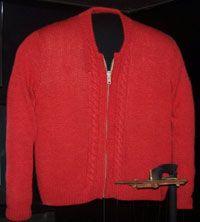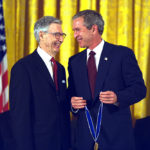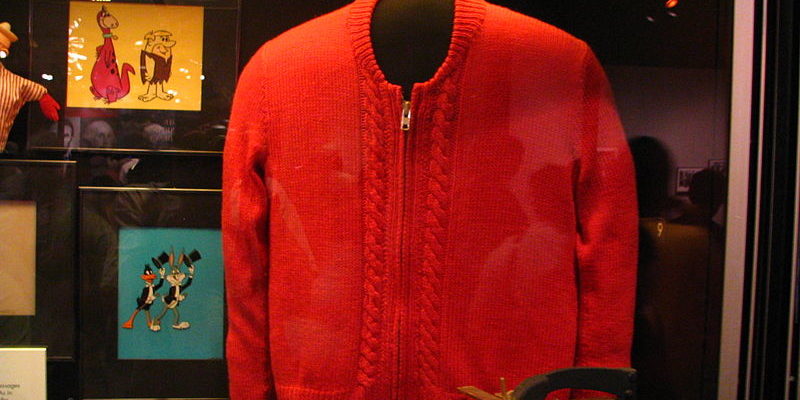 His red sweater is in the Smithsonian Institute.
His red sweater is in the Smithsonian Institute.
Tom Hanks just played his character in a 2019 movie.
Any child who grew up on PBS programming from 1968 on, knows the tune.
“Would you be mine, Could you be mine, Won’t you be my neighbor.”
I know the lyrics suggest that each of those phrases end with a question mark. But in my memory, I  don’t remember Mr. Rogers asking, I remember him encouraging. If ever there was a need for a new symbol of punctuation it would be for the intonation of Mr. Rogers as he donned that red sweater, changed his shoes, looked into the camera with a smile, and formed an invitation to join Mr. Roger’s Neighborhood with his voice.
don’t remember Mr. Rogers asking, I remember him encouraging. If ever there was a need for a new symbol of punctuation it would be for the intonation of Mr. Rogers as he donned that red sweater, changed his shoes, looked into the camera with a smile, and formed an invitation to join Mr. Roger’s Neighborhood with his voice.
 Neighboring was easy on TV. I, you, and others joined in a virtual reality, the mystique of a place we wished for. We collectively lost ourselves in the moment of learning what it meant to be a neighbor. Neighboring was easy before a virus put six feet between us. Even if we did not take full advantage of it before, we miss it now.
Neighboring was easy on TV. I, you, and others joined in a virtual reality, the mystique of a place we wished for. We collectively lost ourselves in the moment of learning what it meant to be a neighbor. Neighboring was easy before a virus put six feet between us. Even if we did not take full advantage of it before, we miss it now.
So, a Medium article last week (here) took the honors for a “Well, duh!” moment declaring, “We Are Not Made for Social Isolation.” Research is recounted. Personal experiences are reported. Alternatives are suggested. And the problems of spending too much time with social media are retold. None of this is new, news (just read Genesis 2:18). However, Medium and sources like it provide us humans with a valuable service: we need reminders.
 Reminded? Reminded of what? Mr. Rogers and every other community-focused individual bases her beliefs about neighboring on ancient wisdom. Proverbs 27:9-10 is classic understanding for folks next door for ours or any day.
Reminded? Reminded of what? Mr. Rogers and every other community-focused individual bases her beliefs about neighboring on ancient wisdom. Proverbs 27:9-10 is classic understanding for folks next door for ours or any day.
Oil and perfume make the heart glad,
And the sweetness of a friend comes from his earnest counsel.
Do not forsake your friend and your father’s friend,
And do not go to your brother’s house in the day of your calamity.
Better is a neighbor who is near than a brother who is far away.
 In the Hebrew tradition, family was everything. The most important relationships in a person’s life were in the home where she lived. Solomonic wisdom points to the family as a high comparison with one’s friend. The Israelite king’s point of view was not to jettison the importance of one’s brother, but to say, “Develop good relations outside your relations, with your neighbor.”
In the Hebrew tradition, family was everything. The most important relationships in a person’s life were in the home where she lived. Solomonic wisdom points to the family as a high comparison with one’s friend. The Israelite king’s point of view was not to jettison the importance of one’s brother, but to say, “Develop good relations outside your relations, with your neighbor.”
Growing a longstanding association with a neighbor suggests what Mr. Rogers taught us; this was an ongoing invitation. Signaling “welcome” in the Middle East included scented lotions (Proverbs 23:5) producing a smile of acceptance. Making life “sweet” included the ease of relationship, something one has come to expect of the person (Proverbs 16:21). Accepting counsel born of deep experience is the sage advice of an individual who has “been there and done that.”
ongoing invitation. Signaling “welcome” in the Middle East included scented lotions (Proverbs 23:5) producing a smile of acceptance. Making life “sweet” included the ease of relationship, something one has come to expect of the person (Proverbs 16:21). Accepting counsel born of deep experience is the sage advice of an individual who has “been there and done that.”
 These friendships are ongoing because, as Mr. Rogers knew, spending time with people is a continual effort. “Do not forsake” means don’t abandon; in religious terms, it meant don’t step-out on God with other gods; or in theological terms, don’t commit apostasy (Deuteronomy 28:20; 29:24; 31:16). Keeping up with longstanding family friends is the persistence of neighboring, the opposite of throwing-over trusted advisors (what Solomon’s son did after his passing in 1 Kings 12:6-8). Maintaining these ties are imperative when calamity – or a virus – strikes. Proximity may be geographical, but it may also be social (Leviticus 21:3; Ruth 2:20).
These friendships are ongoing because, as Mr. Rogers knew, spending time with people is a continual effort. “Do not forsake” means don’t abandon; in religious terms, it meant don’t step-out on God with other gods; or in theological terms, don’t commit apostasy (Deuteronomy 28:20; 29:24; 31:16). Keeping up with longstanding family friends is the persistence of neighboring, the opposite of throwing-over trusted advisors (what Solomon’s son did after his passing in 1 Kings 12:6-8). Maintaining these ties are imperative when calamity – or a virus – strikes. Proximity may be geographical, but it may also be social (Leviticus 21:3; Ruth 2:20).
Maintaining old friends is just as important as cultivating new friends.
 What would Mr. Rogers and Solomon say to us today? Gain and maintain. Losing touch with friends is our loss (versus the neighbor who “loves at all times” as in Proverbs 17:17). Longevity of friendship cannot be overstated (versus the “neighbor” in Proverbs 14:20). Consistency in friendship is prized (versus those who simply use others for their networking as in Proverbs 19:4, 6, 7). Integrity in friends is built over time, necessary for leaders (“the delight of kings,” Proverbs 16:13). Honesty is crucial in a friend; someone you know who will “shoot straight” (a paraphrase of the Hebrew phrase in Proverbs 24:26). Literally, a friend is “one who loves” in Proverbs 27:6, one whose “straight talk” is a demonstration of faithfulness (“favor” is accrued as in Proverbs 28:23).
What would Mr. Rogers and Solomon say to us today? Gain and maintain. Losing touch with friends is our loss (versus the neighbor who “loves at all times” as in Proverbs 17:17). Longevity of friendship cannot be overstated (versus the “neighbor” in Proverbs 14:20). Consistency in friendship is prized (versus those who simply use others for their networking as in Proverbs 19:4, 6, 7). Integrity in friends is built over time, necessary for leaders (“the delight of kings,” Proverbs 16:13). Honesty is crucial in a friend; someone you know who will “shoot straight” (a paraphrase of the Hebrew phrase in Proverbs 24:26). Literally, a friend is “one who loves” in Proverbs 27:6, one whose “straight talk” is a demonstration of faithfulness (“favor” is accrued as in Proverbs 28:23).
So, stay connected with friends. Next-door neighbors are crucial when you need someone to run to

the store for you. Colleagues in the office are essential to our work-wellbeing; reach out even if you won’t be “in” for a while. Social media friends should be enriched by our digital connections. “Call your mom” shouldn’t be something we are told to do. The phone in our hands is just that – a phone! The old AT&T commercial, “Reach out and touch someone” (over the phone that is!) still rings true (pun intended!). Write chalk messages on your driveways and sidewalks. “Selfies” never had higher priority. Playing “Marco Polo” in the pool is now a way to send videos of your kids to their grandparents.
 You can’t beat the wisdom of “neighboring” so well portrayed by Mr. Rogers who followed in the footsteps of Solomon. And I bet someday, we might even find an archeological dig that unearths a Solomonic red sweater.
You can’t beat the wisdom of “neighboring” so well portrayed by Mr. Rogers who followed in the footsteps of Solomon. And I bet someday, we might even find an archeological dig that unearths a Solomonic red sweater.
Mark Eckel is glad to neighbor with anyone and wishes he had a red sweater for just such an occasion. Watch here for “Truth in Two” (minutes) every Tuesday morning or subscribe at our YouTube channel (here). “Neighboring” is an occasional writing. Since Warp&Woof launched in 2007, over 1000 essays, videos, and interviews have been made available.
Picture Credits:
Mark Eckel, By, Luke Renoe
Wikipedia: “Mr. Roger’s Neighborhood,” “Fred Rogers”
Red Sweater, By Rudi Riet – Flickr, CC BY-SA 2.0, https://commons.wikimedia.org/w/index.php?curid=2384877
Statue, By Lee Paxton – self-made, GFDL, https://en.wikipedia.org/w/index.php?curid=25018108
Trolley, By David Pinkerton – https://www.flickr.com/photos/davidpinkerton/4084432764/in/photolist-7dVMyy-7dRYsZ, CC BY-SA 2.0, https://commons.wikimedia.org/w/index.php?curid=75573188



Dr. Eckel, thank you for your writing. It is a timely and lovely piece. A fruitful reminder for me!